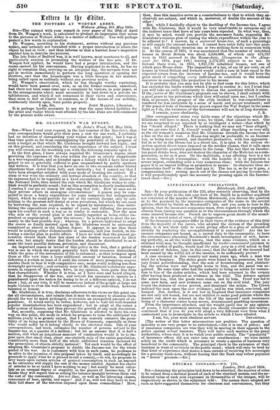LIFE - INSITRANCE OBLIGATIONS.
.Edinburgh, 25th April 1854. SIR—In your publication of the 22d, after correctly observing, that by the verdict of the Jury in the late case here of Dr. Smith he is neither acquitted nor convicted of the murder of William Macdonald, you discuss the question as to the payment by the insurance companies of the sums in the several policies effected by Smith on Macdonald's life, and you seem to lean to the opinion, that the insurance companies must, from regard to their popularity, abstain from raising any question as to the circumstances through which the sums insured became due. Permit me to express great doubt of the sound- ness, in a moral point of view, of this suggestion. If the insurance companies differ in their views of the evidence of this trial from the majority of the jurors, who adopted the dictum of the presiding judge, is it not their duty to resist giving effect to a plan of unheard-of atrocity by rendering the accomplishment of it successful? Are the in- surance companies not bound, as a sacred duty to the community, to have the circumstances attending Macdonald's death investigated of new, know- ing perfectly, as all the world knows, that the same evidence, which on a criminal trial may be thought insufficient by tender-conscienced jurymen to return a verdict of guilty, would lead the same jury in a civil action to find the ground of defence, (say, in this case,) that the death of the insured had been caused by the wilful act of the insurer, to be sufficiently proven ? A case occurred in this country not many years ago, when a man was tried for a burglary. The stolen goods were found in his possession, but the jury found notwithstanding, that the acts of housebreaking and abstract- ing the articles were not brought home to him, and the panel was ac- 'pitted. He some time after had the audacity to bring an action for restora- tion to him of the stolen articles, which had been returned to the owners after having been produced as evidence in the trial. The defence against the action was, that the goods were stolen, and by him. Proof was led to some new facts, and new evidence came out on the civil trial. The jury found the defence of stolen proved, and dismissed the action. The Crown indicted the man upon the new evidence ; and he was tried, convicted, and hanged. But, further, is it not law in England that insurance companies are not only not bound, but are not entitled to make good policies where the insurer can show no interest in the life of the insured ? such insurances being of a character contra bones mores, denominated gambling insurances.
From the importance attached, and the weight justly due to any opinion of yours, I feel extremely anxious that you should reconsider this matter convinced that if you do you will adopt a very different view from what I understand you to promulgate in the article to which I have alluded. I am, Sir, your most obedient servant. IssesatriaL.
[The writer of this letter misconceives our position. The question of morality is one very proper to be entertained,—but it is one of police; and if insurance companies are wise they will be sparing in their appeals to the police against actual insurers. They will leave such matters to the penal authorities, whose duty it is to watch over public morals. The "popularity" of insurance offices did not enter into our consideration : we were intent solely on the credit which is necessary to create a species of business very beneficial to the community. The principal check to the extension of their business is want of certainty in the public mind ; which will only be bred by that kind of experience that makes a man certain of receiving five sovereigns for a genuine bank-note, without fearing that the Bank may refuse payment on " moral " grounds.—En.]


































 Previous page
Previous page